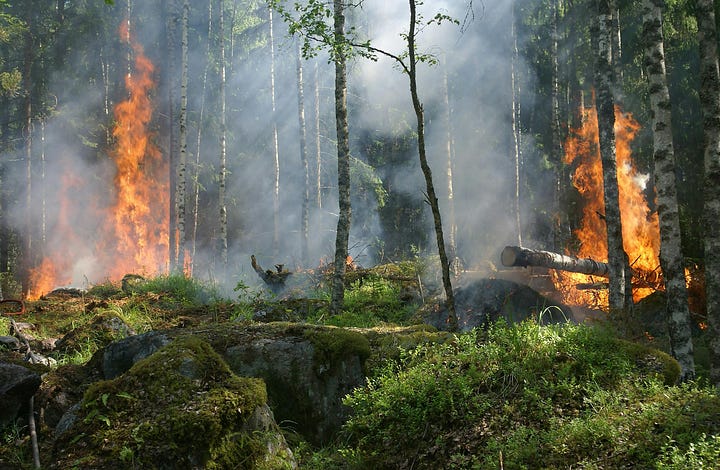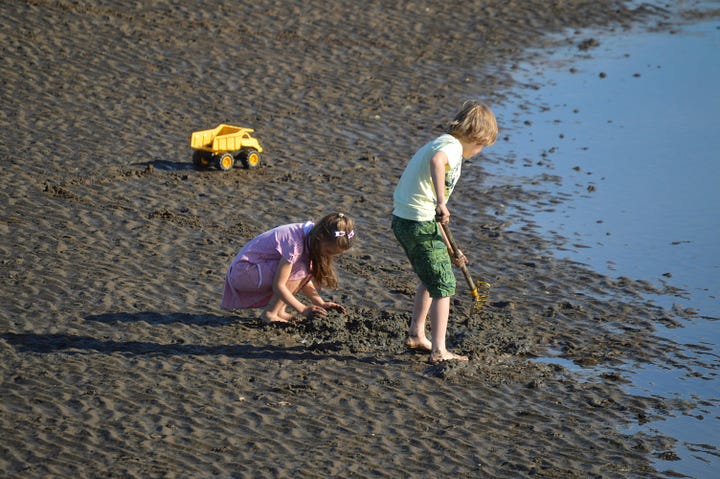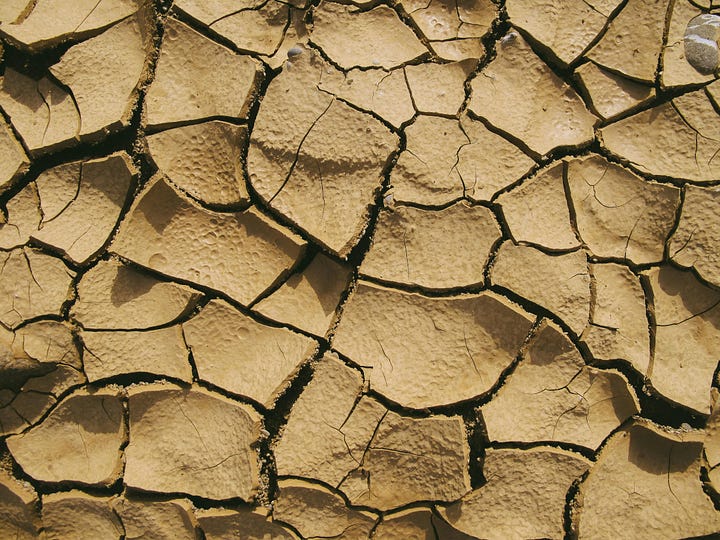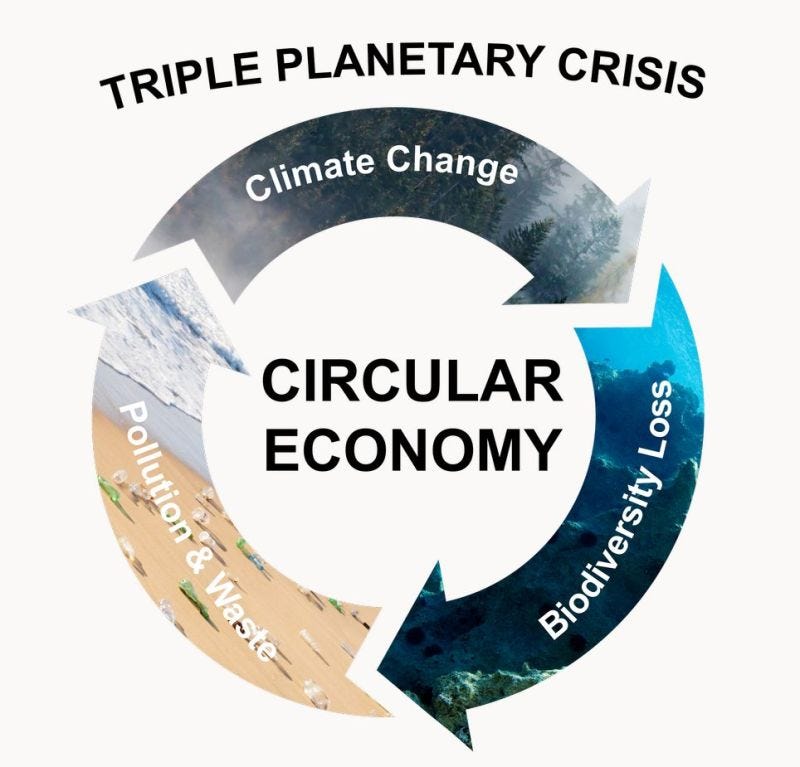Biodiversity Loss? Call It What It is: The Sixth Extinction
Summer doesn't mean what it once did
Hey! I’m Jessica, and welcome to my newsletter about faith and climate action. We are in a climate and ecological crisis, and it’s all hands on deck... Subscribe to join a community of people of faith and like-minded people seeking to make change!




Hi friends. As we move into summer mode (which for me really starts when the kids finish school) I’ve been remembering what summer used to mean but doesn’t anymore.
Summer used to mean:
spending the day at the beach
riding bikes in the fresh air
being in the garden
hot days and comfortable nights
picnics in the shade
Summer now means:
deadly heat waves
wet bulb temperatures where the body cannot cool itself down
forest fires with smoke wafting across provinces and states
extreme weather events
death
Earlier this week, there was an article in the local paper describing a house collapsing into a nearby river in the US. In that article, many terms related to climate change were used:
extreme weather
torrential rains
scorching heat wave
extended flood warnings
record-high
state of emergency
The phrase ‘climate change’ was nowhere to be found, however. This is irresponsible reporting; we need to call something what it is in order to fully understand what has happened and its implications.
In any case though, whether we use the term ‘climate change’ or not doesn’t change the reality; the climate crisis is here, it is happening now, and it is getting worse. Summers no longer mean beach days, bike rides and picnics in the shade. They now mean deadly heat waves and out-of-control forest fires. They mean air quality advisories and humidex levels that make staying inside air-conditioned places a must for human health. They also mean health emergencies and death for those who don’t have access to such places and are most vulnerable.
As I reflect on what summer used to be like and what it’s like now, I’m reminded of the nostalgia some people feel about the church. There’s the way it ‘used to be’, with full pews on Sundays, lots of kids at Sunday School, and coffers full for hiring full-time ministers and running multiple programs. Today, most churches struggle to keep the lights on and afford a part-time minister and experience sparsely attended services and empty Sunday school classrooms.
This paradigm shift in religious attendance has complex roots which are not the same as what has happened to our summers. However, while the circumstances are different between church and summer, there is something that both realities share: the presence of the Holy Spirit.
The Holy Spirit has always been present in and among us as people of faith. She guides and empowers us, enlivens and challenges us. Just as we are encouraged to pay attention to where the Holy Spirit is present as we reflect on the present and future of the church, so we are invited to reflect upon where the Holy Spirit is in the climate crisis. What is she up to? Where are we being guided and empowered to take climate action? How are we being enlivened and challenged to take faith-based climate action?
As the meme says, this is the coldest summer of the rest of your life. To that I hear the Holy Spirit asking, What are you doing about that? How are you called to act? This is your Friday Nudge, my friends: to pray and ask yourselves these questions. Wherever you are experiencing the summer heat right now, and however cushioned against its worst effects you are, ask the Holy Spirit to show you what you are called to do, and how you are called to act.
AMEN.
How are you called to take climate action? Let us know!
Want to support my work but not ready or able to subscribe yet? You can make a one-time contribution. Click here:
Not everything we’ve done and are doing to the Earth is a matter of the climate, even though everything is interconnected. The UN says the Earth is facing a triple planetary crisis: biodiversity loss, climate change, and pollution. It’s important to understand this triple emergency for several reasons. The first is that we cannot change what we don’t understand. Thus, knowing something about biodiversity loss and pollution, as well as the climate emergency, is vital. Second, all three planetary problems, and others too, are interconnected. We cannot fully understand one aspect of the ecological crisis without comprehending the others. And the climate crisis is now such an existential threat that it is implicated in everything else that is happening on and within the Earth community. While I’ve written about the climate crisis in this newsletter, I haven’t spent as much time exploring the loss of nature or the threat of pollution. Today, I want to talk about the crisis of biodiversity loss and its implications for the future.

Biodiversity Loss? Call It What It Is: The Sixth Extinction
Whenever you see the words ‘biodiversity loss’ or ‘loss of nature,’ insert the term ‘sixth extinction’. The former terms may be gentler on the ears, but they fail to convey the scope of the problem. Scientists have determined that the Earth is in a period of global mass extinction. Mass extinction is when the planet loses a significant proportion of its flora and fauna in what is considered a “geologically insignificant amount of time.”
If you are enjoying this newsletter and want to show your support, you can upgrade to a paid subscription. This work is my livelihood; every paid subscription makes it possible for me to continue. Thanks very much!
(If you wish you could upgrade but can’t right now, email me and I’ll comp you a one-year subscription. No questions asked.)
Keep reading with a 7-day free trial
Subscribe to Faith. Climate Crisis. Action. to keep reading this post and get 7 days of free access to the full post archives.







